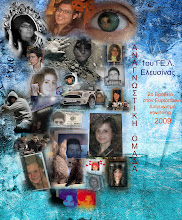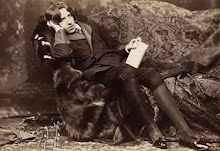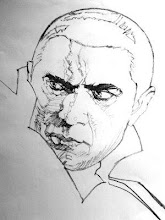
"How old is Dorian Grey's portrait?"
Now there is an intriguing question from the Romanians! Some of the answers were, 17, 90, 36, but when we thought about it better, we agreed that the portrait is ageless, just as good and evil in human nature. Whether man is born good, was a philosophical debate and most of the Greek team gave a Socrates-like answer "Ουδείς εκών κακός", "Nobody is evil by nature", while the Romanian team went for an Aristotelian anwer saying that good and evil is found in different degrees within us all, and is a matter of influence and circumstances which dominates. Speaking about influences, personal responsibilities and choices, based on the book, we were under the impression today that the chat merely touched the themes and opened questions, rather than came to a definite answer. That's philosophy for you! We had to hurry to our math term exams and biology lessons and had an etwinning chat break, which whetted our appetites for the next one on Phaedros.
Library moments before the chat
 "So, you want to toy with the projector?" Then listen to Plato's allegory of the cave, and make your own shadow of the prisoner who thought that what he saw was reality.
"So, you want to toy with the projector?" Then listen to Plato's allegory of the cave, and make your own shadow of the prisoner who thought that what he saw was reality.
Fresh news from the Greek Library. We are preparing for our chat on Dorian Grey, anticipating Phaedros from Plato, and library members came to make hand-shadows (typical!). But mischief was soon turned to story-telling and philosophy-within-a-school-break. Panos and Yiannis joined hands to make the "troglodytis" (a little like Quasimodo, don't you think?) and we can use it as a starter for Plato's theory of Forms.
The "appearance and reality" theme haunts all classical literature. Where is it found in Dorian Grey? See you soon!!
Πριν το τσατ, ήρθαν στη Βιβλιοθήκη τα πιστά μέλη και έκαναν σκιές στο βιντεοπροβολέα που είχε στηθεί για την τηλεδιάσκεψη. Ευκαιρίας δοθείσης, άκουσαν το μύθο του σπηλαίου του Πλάτωνα, και η μικρή αταξία μετατράπηκε σε πεντάλεπτο μάθημα φιλοσοφίας. Αργότερα... συζητήσαμε για το ποια είναι η πραγματική ηλικία του πορτραίτου του Ντόριαν Γκρέυ, που ήταν μια ενδιαφέρουσα ερώτηση των Ρουμάνων. Η απάντηση που προτιμήθηκε είναι ότι είναι άχρονο, όπως η αρετή και η κακία στην ανθρώπινη φύση. Στη συνέχεια επιχειρήθηκε να απαντηθεί η κλασική διαμάχη αν ο άνθρωπος γεννιέται κακός ή γίνεται. Η ελληνική ομάδα ήταν σωκρατική στην απάντησή της "Ουδείς εκών κακός" ενώ η ρουμανική έκλινε προς τον Αριστοτέλη, υποστηρίζοντας ότι καλό και κακό συνυπάρχουν στον άνθρωπο και εκδηλώνονται ανάλογα με τις συνθήκες. Αντί για απαντήσεις τρέξαμε πίσω στα μαθήματά μας με περισσότερα ερωτήματα περί αρετής. Άξιζε πάντως αυτό το ζωντανό φιλοσοφικό μας διάλειμμα!
























16 comments:
Library moments. Shortly after the post, Andonis Theofylaktidis, 18, came and we had a little talk:
"Andoni, do you know the allegory of the cave?"
"Do you mean Plato?"
"Yes, did it make any impression on you?"
"It is very up-to-date"
"Meaning?"
"I mean contemporary politics and worn-out mentalities, many of which are mistaken"
"Can you give me an example?"
"Well, the way the media and some politicians sway peoples' opinions reminds us of the "dimagogoi", the people who manipulated the prisoners in the cave, showing them shadows of puppets for the real world... Also, in some parts of the world people still hold mistaken views about women's rights, for example"
"Can you make a note for our portalal?"
"Sure!"
Library translation of authentic dialogue:
-Αντώνη, ξέρεις τον μύθο του σπηλαίου;
-Εννοείτε την αλληγορία του Πλάτωνα;
-Ναι. Τι σου έκανε εντύπωση σε αυτό;
-Το επίκαιρο του θέματος.
-Δηλαδή;
-Μιλάω για την πολιτική και τις τρέχουσες αντιλήψεις. Πολλές απ' αυτές είναι λάθος.
-Τι εννοείς;
-Να, όλα αυτά που συμβαίνουν τελευταία στην πολιτική θυμίζουν τους δημαγωγούς που κουνούσαν τα ανδρείκελα και οι τρωγλοδύτες, βλέποντας τις σκιές τους στοντοίχο της σπηλιάς, τα περνούσαν για πραγματικότητα. Επίσης σε μερικά σημεία του Τρίτου κόσμου, οι λανθασμένες αντιλήψεις π.χ. για τη θέση της γυναίκας έχουν την ισχύ αλήθειας.
-Θα το γράψεις αυτό για το etwinning?
-Βέβαια!
Δεν ήταν ακριβώς πλατωνικός διάλογος, αλλά ένας συνηθισμένος διάλογος δασκάλου-μαθητή στη Βιβλιοθήκη!
I was there too!aris
Πιστεύω ότι ο άνθρωπος δεν γεννιέται κακός αλλά γίνεται κατά την διάρκεια της ζωής του/ της μέσω των άλλων συνανθρώπων του που τον/ την επηρεάζουν αρνητικά.
Ελένη Οικονομίδου 17 Χρονών
I believe that man is not born evil but he/she becomes evil during his/her life through other people
who influence them negatively.
Translated by Kostas Papageorgiou
January 22, 2009 11:25 AM
In fact, before asking how old was the picture of Dorian we wanted to ask how old is your own picture...And if I remember well we did it and Christina told us that her picture might be 20 years old...
Our teacher said that her own picture has to be much younger than she is...She is always so funny!!!
And about the good and the evil in human nature, in my opinion God gave us the oportunity, if I can call it like that, to born neutral, not bad and not good and then to chose the way we want to live.
And about Dorian, I think he was week, he could not find his own way, that is why he was almost manipulated in the wrong way...
I agree with your teacher. My inner picture is also younger than my outer (ouch!)but I have recently aged (or matured). About time, too!
I want to believe that my picture is younger than me too...maybe now the difference is not so big...but after years, when we are old, i think is very important that our picture remains always young.
Το «πορτρέτο» μου είναι λίγο μεγαλύτερο από εμένα. Τόσο έτσι ώστε να έχει απόλυτη ελευθερία. Νομίζω όμως ότι η ζωή μου θα μείνει εκεί. Στην ηλικία των 20. πιστεύω ότι είναι η πιο όμορφη ηλικία! Λυδία, 16
My portrait is 4 years older than me. In her twenties. It’s the best age to be, since I will have the independence I dream of . Lydia, 16, (library translation)
Πιστεύω ότι το πορτραίτο μου είναι 15, διότι εκείνο το διάστημα της ζωής μου ήταν πολύ όμορφο, γεμάτο φίλους και ανθρώπους που με στήριζαν σε ό,τι κι αν έκανα. Επίσης γιατί ήταν μια περίοδος που είχα αριστεύσει στο σχολείο και γι’ αυτό θα ήθελα να βρισκόμουν σε αυτή την ηλικία. .
I believe that I am in age o 15 because that time in my life was very nice, full of friends and people who supported me no matter what I did.
Moreover, another factor is that was a period during which I was a very good student and that is why I wish I was still in that age.
Translated by Kostas Papageorgiou and Panos Repaiskas
Apart from bookclub members, the kids who came to the library today found the question "How old is your own portrait?" interesting.Some of their answers are published here. Other kids help with the translation and posting.
There are three ways that you can view at a man’s age: from a chronological, a biological and a psychological point of view.
I personally feel that my psychological portrait is that of a (perky) 70-year-old man because I feel very mature. I hope I don’t come through as arrogant though
-Anthony Theofilaktidis, 18
My emotional age agrees with my biological, as I have been able to do the things I had planned, so far. From now on, I look forward to new plans. I suppose this is one of the reasons my ages coincide.
They say everything happens in its own time. The fact that people think their portrait is younger than themselves, is probably explained by the fact that something they had to do wasn't done. A piece of the puzzle is missing in their lives, so we have a case of arrested development (as the librarian told me today. Fotis, 17, library member
This was a very interesting chat, for sure!
I think that we people are born "almost neutral" because there is that "something" inside us that determines us make some decisions. It's true that the environment has a big influence on us, but I'm sure that there's a voice within us that often whispersssss...:)
Ioana,16.
Exactly what the ancient philosopher Socrates said, when he talked about the inner voice of conscience, "demonion"!
I am very pleased to talk with you and my own students about Socrates, as Plato's dialogue "Kriton" is the theme for the Hellenic Student Competition on Ancient Greek. Maria Gerandreou from the bookclub is participating, and I hope all this helps as a complementary non-systematic form of learning.
At this moment, i have the courage to confess you that my picture,my real picture hasn't born yet,hasn't been painted yet.why? because,even if i have 17 years old,i can't see very well in my soul and i can't read in my mind.Probably,my painter didn't start to work it and he is preparing with care,patience,love and faith to realise a good picture.
I am sure that it will be better that Dorian's :D i promise that i will announce you when it will be ready.
pi.es.:i'm impatient to begin the discussion of the next book-Phaedros.
pi.es.2: i'm starting to do my luggage for the summer camp :P
pi.es.3:My name is Alexandra
I just read all your discussion and I will like to make the following comments:
1. Alexandra, congratulations for your positive thinking. I've never seen you so self confident and optimistic. And I'm also sure that your portrait will be better than Dorian's. All you need to do is to find a good painter; or to be more precise, you should find THE PAINTER (you just remembered me of a wonderful film –„Modigliani”)
2. Regarding the discussion about men being born good or evil… I just had a talk yesterday with some of my colleagues and even if we liked it or not we reached the conclusion that man is not good by nature, but evil. And that if he becomes good, it’s only due to society which makes him to control his animal instincts. It’s quite sad when you think that we like to consider ourselves independent and free and we think that we can survive and even be the same outside the society; in fact it’s only an illusion
3. Regarding the topic about the age we have in pictures, I think that the purpose of pictures is not necessarily to reflect our age (I refer here to the biological or chronological age that Theofilaktidis mentioned), but more to remember us of different ages when we used to do certain things. So our album of pictures for example should not be a set of pictures that presents us getting old, but rather an exposition which shows us how wonderful our life was.
George, 19
P.S. this was my firs post, but I hope I will get in touch with you more often. It’s quite an unique thing you have accomplished with this blog; and I do not refer necessarily to the blog itself but to this wonderful climate that you have created. Congrats!
Σειρά ελληνικού καναλιού έχει στρέψει το ενδιαφέρον των μαθητών μας στις μεγάλες μορφές της ιστορίας και του πολιτισμού. Είναι απόλαυση να ανοίγουν τέτοιες κουβέντες στους διαδρόμους, στα διαλείμματα, στο δρόμο για το σπίτι.
Μεταφέρω αυθεντικό διάλογο στο διάλειμμα με τα μέλη της βιβλιοθήκης:
Χριστίνα (Α Λυκείου): Κυρία, είδατε το ντοκυμανταίρ για τον Πλάτωνα;
Υπεύθυνη Β/κης: Τι σου έκανε εντύπωση, Χριστίνα;
Χριστίνα: Κυρία, που επινόησε ένα καινούργιο πολίτευμα, επειδή υπήρχε κρίση αξιών στην εποχή του. Όπως δηλαδή και στη δική μας!
Υπεύθυνη Β/κης: Ναι, αλλά το ξέρεις ότι δεν ήταν δημοκρατικό; Ήταν αριστοκρατικό…
Χριστίνα: Εμένα μου έκανε εντύπωση που ήθελε οι φιλόσοφοι να κυβερνάνε, όχι οι πολιτικοί!
…
Κι ακόμα μου άρεσε η επιγραφή που είχε στη σχολή του «Ουδείς αγεωμέτρητος…» Να μη μπαίνει κανείς που δεν ξέρει μαθηματικά. Και στη σχολή του φοιτούσαν και γυναίκες!
Υπεύθυνη Β/κης: Σπάνιο αυτό. Θα πρέπει να το διασταυρώσω…
Χριστίνα: Είπε ότι δεν υπάρχει απόλυτος κύκλος στη φύση!
Υπεύθυνη Β/κης: Σωστό αυτό!
Χριστίνα: Ναι, αλλά η κόρη του ματιού μου; Το φεγγάρι;
Υπεύθυνη Β/κης: Δεν είναι τέλειοι κύκλοι…
Χριστίνα: Και είπε και τις απόψεις του περί έρωτα…
Υπεύθυνη Β/κης: Ναι, αυτό που κάναμε μαζί με την αναγνωστική ομάδα, θυμάσαι; Ότι ο ερωτευμένος άνθρωπος θυμάται όσα έχει δει στον ουρανό και έχει μια φαγούρα σα να βγάζει φτερά, για να πετάξει σε υψηλότερες σφαίρες…
Χριστίνα: Ναι.
Αντώνης (τελειόφοιτος), μπαίνει στη συζήτηση: Βασικά ο Πλάτωνας έψαχνε, λέει, δύο πράγματα, τη δικαιοσύνη και την αλήθεια…δεν έδινε σημασία που τον χλεύαζαν οι σοφιστές γι’ αυτό…και, κυρία, είχε δραματοποιημένο το μύθο του σπηλαίου (παλαιότερη συζήτηση μας στο https://www.blogger.com/comment.g?blogID=5871421749041757129&postID=5597575530735089753 )
Το κουδούνι χτύπησε και η συζήτηση συνεχίζει στα επόμενα διαλείμματα περί Μεγάλου Αλεξάνδρου. Τα παιδιά υποστηρίζουν με το ίδιο πάθος ό,τι τα ενδιαφέρει, είτε είναι η ταινία βαμπίρ Λυκόφως, είτε οι Μεγάλοι ΄Ελληνες…
Post a Comment